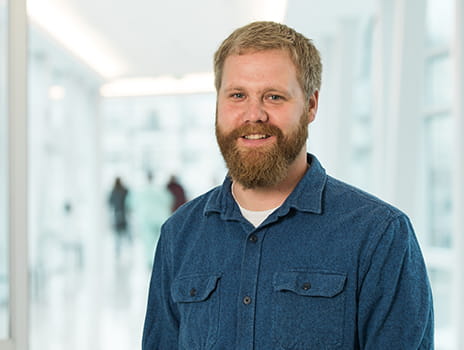Liver Transplant Restores Farmer's Health


Keith Briscoe farms a piece of land in southwestern Kansas that was handed down from generation to generation in his family. His great, great grandfather, a freed slave whose family members were buffalo soldiers, left Kentucky to homestead the property in the 1880s.
It was Keith's dream to continue improving the family farm and leave it to his children. However, serious health problems threatened to ruin those plans.
In 2005, Keith took a trip to Mexico. During his visit, Keith developed intestinal problems that never resolved. He was diagnosed with ulcerative colitis requiring a total colectomy – surgical removal of his entire colon. He was just 21 years old.
For several years, Keith's health remained stable. But in 2012, he took a turn for the worse. The bile ducts leading from his liver to his small intestine became obstructed, causing pain, fatigue and jaundice. Keith's local family physician referred him to The University of Kansas Health System.
It was important that Keith be evaluated by a multidisciplinary team of specialists at an academic medical center. Hepatologist Ryan M. Taylor, MD, led the way.
"Keith had a rare liver disease called primary sclerosing cholangitis," Dr. Taylor says. "It can be really tricky because it manifests differently in every patient. In Keith's case, we worked to control infection, to drain bile as best as possible and manage nutrition."
Key to draining the bile on behalf of the diseased liver was the placement of a biliary decompression catheter. Interventional radiologist Steven Lemons, MD, performed the procedure, inserting a catheter through the skin and into the bile ducts that extend into the duodenum. This allowed bile to drain from the body, improving Keith's clinical condition as he waited for the inevitable liver transplant.
Dr. Lemons used ultrasound and fluroscopy – real time X-rays that show motion – to guide his placement of the catheter.
"Keith was living with a progressive disease, and the body's inability to drain bile causes discomfort as well as the risk of recurrent fever, chills and hyperbilirubinemia," Dr. Lemons says. "This procedure served as a bridge to transplant, improving Keith's condition and quality of life as he awaited a liver. It is a strong example of the collaboration among disciplines that enables our care team to provide complete care and create complex solutions for complex problems."

As an organ donor, you hold the key to the lives of as many as 8 other people. By placing your name on your state donor registry, you convey your desire to save lives through donation.
By 2015, Keith's need for a liver transplant had intensified. The first step was an evaluation at the Center for Transplantation at The University of Kansas Health System. Patients must be medically and emotionally prepared to handle the challenges of transplant. Keith passed the tests and was added to the waiting list for a liver.
In June 2015, Keith was out working with his cows.
"Back then, I could barely put in a half-day's work," he recalls. "Around 3 o'clock in the afternoon, my mom and dad sent me home and I went to bed. About midnight, the phone rang."
A matching donor had been found.
"It was just surreal to get that call," Keith remembers. "There were others on the waiting list ahead of me, but they needed a liver and kidneys. With just a liver available, my situation put me first in line. I said goodbye to my kids, and we hit the road immediately."
It was a 6-hour drive from the family's home in Montezuma to The University of Kansas Hospital in Kansas City. His transplant team was ready and waiting. The surgery lasted several hours. At first, everything seemed to go well, but then Keith suffered acute complications. His new liver was failing.
Keith's first transplanted liver lasted just 9 days. Because he was sedated during that time, he is certain the experience was harder on his family than it was on him.
"When my wife heard I would need a second transplant, she literally collapsed into my mom's arms," he says.
According to Dr. Taylor, "There is a safety net in place for obtaining a second liver when a transplanted patient might have just hours or days left. Keith was in that desperate situation."
This time, Keith waited just 23 hours for a liver.
"It was an act of God," Keith says. "This just doesn't happen."
The second liver transplant was a success. There were some initial challenges with Keith's immune system, but today he is doing well.
"Keith rolled with the punches during a few scary months and it paid off," Dr. Taylor says.
Keith remembers the transplant unit fondly.
"Unit 64 has the best nurses I've ever met, and I've been to other big hospitals," he says. "They were the most caring and affectionate nurses by far. Each person went above and beyond their job title to help me."
Dr. Taylor agrees.
"Our surgeons, operating room staff, wonderful nurses, phlebotomists, financial people, receptionists, greeters – even our folks who transport patients," he says. "There's a warm and friendly feeling throughout our extended transplant team."
It's essential to have strong support before, during and after an organ transplant. Keith's family sustained him and each other. His church family helped, too. Keith is especially thankful that his kids – Ander, 14; Asa, 10; and Aubyn, 6 – were invited to stay with friends so they didn't have to travel for all the appointments and surgeries.
Keith wishes he could give his donor's family a big hug.
"If it wasn't for someone checking that box, I wouldn't be here today," he says. "I wouldn't be tucking in my daughter. I wouldn't be coaching my sons' teams. I have no doubt about that."
Today, Keith has the energy to work side-by-side with his father raising wheat, row crops and 350 head of cattle. Natalie, his wife, laughs, "I could barely keep up with sick Keith. I really can't keep up with new-liver Keith."
Keith explains, "I've never been one to stay still, but now that I feel good, I try to do everything I can. I want to build something here on our land for my kids to have when they grow up."
We offer a variety of appointment types. Learn more or call 913-588-1227 to schedule now.